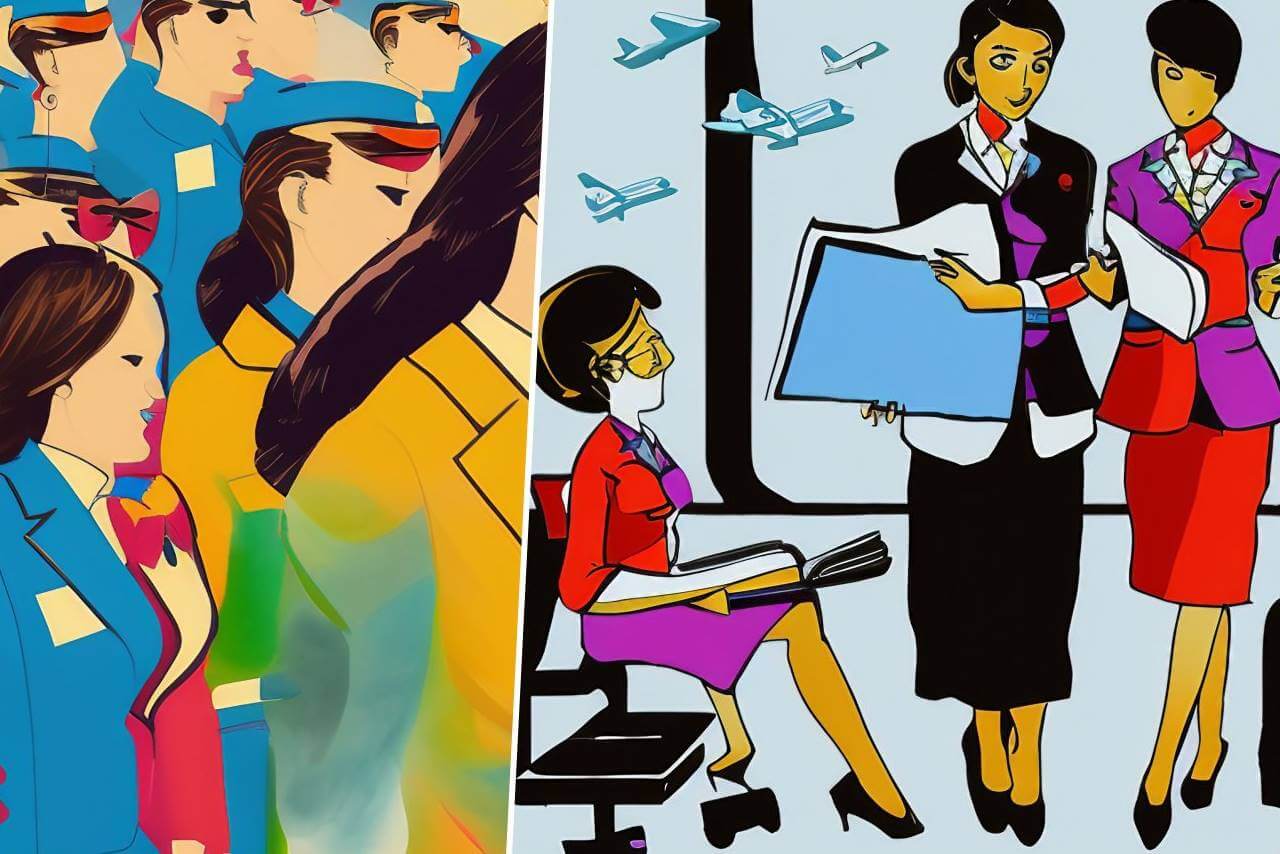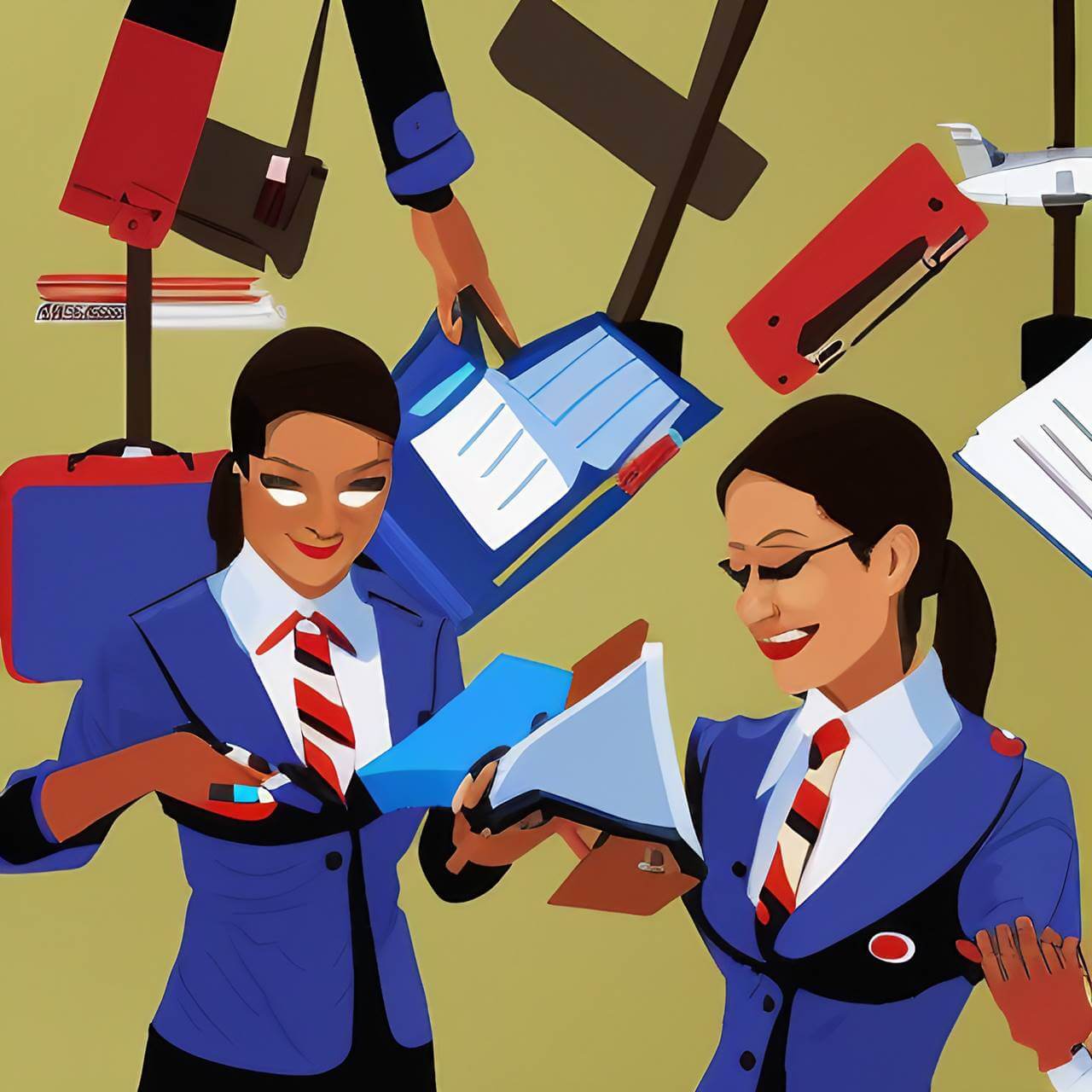So you want to be a flight attendant? Great! It’s a fun and exciting career. A lot of people tend to easily assume that the flight attendant job is simply about smiling all the day long and wearing that stylish uniform. Being a flight attendant requires much more than that. What are the basic flight attendant skills and knowledge? What you need to have to be to be successful in this field?
Also Read: 13 Tips on How To Become a Flight Attendant
Flight attendants need to possess a variety of skills and knowledge in order to do their job effectively. Some of the basic flight attendant skills include attention to detail, communication and interpersonal skills, multitasking, problem-solving skills, time management and much more. Read on for a breakdown of the key skills and knowledge that all flight attendants should possess.
Contents
- List of Basic Skills and Knowledge Required to be Flight Attendants
- The Process to Become a Flight Attendant
- The Challenges Flight Attendants Face, and How They Deal with Them
- The Benefits of Being a Flight Attendant: Professionally and Personally
- Age Limits or Number of Working Hours Restrictions
- Other Airline Career Opportunities
- Summary

List of Basic Skills and Knowledge Required to be Flight Attendants
There are some essential skills and information needed if you want to be a flight attendant.
- First, flight attendants must have excellent communication skills to provide customers with information and assistance during the flight.
- They must also have strong problem-solving abilities to handle any unexpected situations or emergencies that may arise during the flight.
- Regarding multitasking, flight attendants must be able to handle multiple tasks and duties at the same time. This involves anticipating passengers’ needs, dealing with customer service issues, managing seating arrangements and preparing meals or beverages. The ability to remain organized and prioritize tasks is essential in this role.
- Attention to detail is also a skill essential for being a flight attendant. From ensuring food and beverages are correctly served, a flight attendant must be focused on their job and pay close attention to detail. They should also be able to quickly identify safety concerns or potential problems and take action accordingly.
- Time management is another attribute to be a successful flight attention. They must be able to adequately manage their time in order to complete all tasks on time as well as attend to passenger needs. Unlike jobs on ground, flight attendants have the pressure to finish their tasks at allocated times because their office, the airplane, needs to take off and eventually land later on. They simply cannot carry on serving food and drinks during take off and landing. They have to attend to safety protocols and be seated themselves.
- Additionally, flight attendants need to have a thorough understanding of emergency procedures and equipment, as well as a solid grasp of first aid techniques.
- Furthermore, flight attendants need to be knowledgeable about security protocols, airline policies, and safety regulations.
- Beyond these practical skills and knowledge, it is also important for flight attendants to possess exceptional customer service skills to ensure their passengers have a comfortable and enjoyable experience.
Overall, having these basic skills and knowledge is vital for success as a flight attendant.
Also Read: 15 Must-Have Qualities of Cabin Crews

The Process to Become a Flight Attendant
So you want to become a flight attendant? Great! The first step is to meet the basic qualifications, which typically include being at least 18 years old, having a high school diploma or equivalent, and being able to speak and understand English fluently. Most airlines also require flight attendants to be able to swim and be willing to relocate.
Next, apply for an open flight attendant position with an airline. This process can vary from airline to airline, but it generally includes submitting a resume and completing job assessments and interviews.
Once hired, new flight attendants will attend an intensive training program where they learn about safety procedures, emergency response protocols, customer service skills, operating equipment on the plane, and more. This training can last anywhere from two weeks to several months before the flight attendant is deemed fit for solo flights.
After that initial training period, flight attendants typically receive ongoing updates and refresher training throughout their careers. And just like that – you’ve officially become a flight attendant! Ready for take-off?
The Challenges Flight Attendants Face, and How They Deal with Them
As a flight attendant, every day brings new challenges and obstacles to overcome. Flight delays and cancellations can throw entire schedules off balance, or passengers may have special requests that require quick thinking and adaptability. In addition, flight attendants must always be prepared for emergencies on the plane, from medical emergencies to in-flight turbulence. However, they are trained to handle these challenges with grace and efficiency.
Flight attendants work closely with the pilot and crew members to stay up-to-date on any changes in schedule or potential issues during the flight. They also receive extensive training in responding to emergencies, ensuring the safety of all passengers on board. While there will always be challenges in their line of work, they have the skills and experience necessary to approach them confidently and effectively.
Also Read: 11 Things Flight Attendants Hate about the Job
The Benefits of Being a Flight Attendant: Professionally and Personally
Being a flight attendant offers a unique opportunity to see the world and meet new people daily. Professionally, flight attendants get training in safety procedures and emergency protocols, giving them essential skills for any career. On a personal level, the job offers flexibility in scheduling, as well as the potential for exciting layovers in different cities and countries.
Along with valuable job experience, flight attendants also gain many perks such as discounted airfare for themselves and their families. In addition to the tangible benefits, being a flight attendant allows individuals to develop independence and excellent communication skills while interacting with a diverse range of individuals. Overall, being a flight attendant offers both professional growth and personal fulfillment.
Age Limits or Number of Working Hours Restrictions
Becoming a flight attendant does have certain age and experience requirements. Most airlines require applicants to be at least 18 years old, and some even have a maximum age limit of 35 or 40. As for experience, most airlines require applicants to have at least a high school diploma or equivalent, as well as a previous customer service experience.
Additionally, to be a flight attendant, you must have logged a minimum number of flight hours. This varies by airline, with some requiring 500 or 1,000 hours of flight time while others do not have a minimum requirement. It’s important to note that regardless of age or experience level, any applicant must pass the necessary medical and background checks to become a flight attendant.
Overall, while there are specific age and experience requirements for becoming a flight attendant, each airline may have slightly different criteria. It’s always best to check with individual airlines for more detailed information on their hiring process and requirements.
Also Read: How Many Days Do Flight Attendants Work?
Other Airline Career Opportunities
Some people dream of becoming flight attendants, but there are many other positions within the airline industry that might be a better fit for them. For example:
- Airline mechanics ensure that all aircraft safely meet regulatory standards before takeoff and perform routine maintenance during layovers.
- Air traffic controllers coordinate take-off and landing times at airports to ensure safe and efficient travel.
- Flight dispatchers oversee flight plans, serve as a crucial resource for pilots during unexpected events, and monitor weather conditions.
- Airport operations staff handle ground support and assist with baggage handling.
- Airlines also employ reservation agents, customer service representatives, concession workers, and administrative staff in their offices.
Exploring the different roles within airlines can help aspiring professionals determine which job best aligns with their interests and skill sets. Along with familiarizing oneself with the flight attendants’ responsibilities, researching the various departments within an airline can lead to discovering new potential career paths in the industry.

Summary
Becoming a flight attendant requires specific skills and knowledge, such as emergency protocols and customer service experience. There are also age and experience requirements that must be met to be eligible for the job. However, many other positions within the airline industry may be a better fit for some individuals.
Familiarizing oneself with the flight attendants’ responsibilities, and researching the various departments within an airline can lead to discovering new potential career paths in the industry.